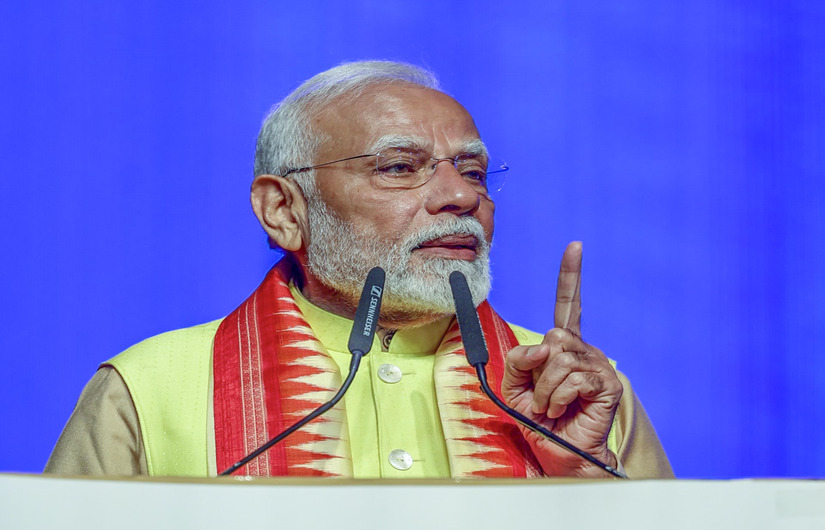Prime Minister Narendra Modi recently praised the Maharashtra government’s efforts to combat the long-running Maoist insurgency that has afflicted many regions of the state in a momentous acknowledgement. This commendation was given in a public speech when he emphasized the improvements and the state’s efforts to address the socioeconomic problems in impacted areas as well as the security threats posed by Maoist organizations. The successes of the Maharashtra government are a tribute to the tenacity of the local government, security forces, and, most crucially, the insurgent-affected people in a state that has endured years of violence and instability as a result of the Maoist insurgency.
The Roots and Challenges of Maoist Insurgency in Maharashtra: A Step Toward Progress
The 1967 Naxalbari rebellion in West Bengal marked the beginning of the Maoist insurgency, which had its roots in ideological, economic, and social issues. It later extended to Maharashtra and other regions of India. Maoist activities centered in important districts including Gadchiroli, Chandrapur, and parts of Vidarbha. Insurgent organizations flourished in these areas because of their thick forests, rough terrain, and disenfranchised indigenous people. These areas, which had been ignored historically, presented serious difficulties for government and law enforcement. But with the help of the central security forces, Maharashtra’s administration has improved security and weakened Maoist influence in recent years. Prime Minister Modi’s commendation recognizes the state’s accomplishments and emphasizes the benefits of teamwork in lowering insurgency and bringing stability back.
Security and Governance Reforms
Maharashtra’s all-encompassing security strategy has played a significant role in its success in combating the Maoist insurgency. This multifaceted strategy combines counterinsurgency operations, intelligence collection, and law enforcement, and it produces noteworthy outcomes. With the help of specialized units like the C-60 Commandos, the Maharashtra Police have been instrumental in destroying Maoist strongholds by applying their knowledge of jungle warfare. Maharashtra’s cooperation with central organizations, including the CRPF, has strengthened operations by supplying essential manpower and logistical support. In order to restore normalcy, the state administration has concentrated on building roads, bridges, and communication networks. By interfering with insurgents’ supply routes and mobility, these measures not only improve economic conditions but also increase security in isolated areas.
Socio-Economic Development: A Key to Long-Term Peace
1. In order to win over the hearts and minds of the people in impacted areas, socioeconomic development is just as crucial as military and law enforcement tactics in controlling insurgency. Understanding this, the Maharashtra government has prioritized enhancing livelihoods, healthcare, and education in areas dominated by Maoists.
2. Large segments of the tribal people were previously at risk of radicalization and exploitation by Maoist factions due to a lack of access to high-quality healthcare and education. Under the direction of Chief Minister Eknath Shinde and his predecessors, the Maharashtra government has launched a number of social programs aimed at the tribal groups, especially in the districts most impacted by insurgency.
3. To ensure that children are not only protected from Maoist recruiters but also given the opportunity to create a better future, the state, for example, has increased efforts to improve the quality of basic education in isolated tribal communities. Furthermore, mobile medical units and health camps have been established to offer healthcare to individuals in remote locations where access to medical institutions was previously limited.
4. Additionally, agricultural projects have been encouraged to strengthen local communities’ economic resilience. The government has been trying to improve the conditions for indigenous industries, including livelihoods based on forests, and give farmers better access to markets by introducing modern farming practices. The government is tackling the underlying causes of Maoist sympathies by raising the socioeconomic standing of these groups, which will lessen the basis of recruitment for the insurgency.
Tribal Empowerment and Peacebuilding
At the heart of Maharashtra’s strategy is empowering tribal communities and ensuring their inclusion in development. Reflecting the national motto “Sabka Saath, Sabka Vikas” (Together with all, Development for all), the state has implemented programs providing land rights, access to forest resources, and job opportunities. These initiatives aim to reduce tribal alienation and counter the Maoist narrative, which portrays itself as a protector of tribal rights. By directly addressing grievances, the Maharashtra government has won over many previously sympathetic to insurgents. Additionally, the state has focused on building local peace committees and platforms for dialogue between the government and tribal communities, easing tensions and fostering cooperation. These efforts have played a crucial role in diminishing the influence of extremist ideologies in the region.
Looking Ahead
There are still issues even if Maharashtra’s Maoist-affected areas have seen significant progress in terms of development and security. The persistence of some Maoist groups and intermittent bloodshed serve as a reminder that there is still a long way to go before there is total peace and stability. Supporters and sympathizers of the Maoists still exist, especially in rural and remote areas where there is still little government presence. Prime Minister Modi’s commendation of the Maharashtra government’s advancements, nevertheless, is a noteworthy recognition of the state’s accomplishments to date. Maharashtra may stay on course to attain lasting peace and prosperity for its tribal inhabitants and the state at large by maintaining its emphasis on security, development, and community involvement.
Conclusion
The acknowledgement of PM Modi is a celebration of his accomplishments and an inspiration to continue moving forward with even more vigor. In addition to being a win for Maharashtra, the state’s triumph in Maoist-affected areas serves as a ray of hope for other places dealing with same difficulties. The goal of a peaceful, affluent Maharashtra appears to be closer to reality with continued dedication from the state and federal administrations.
